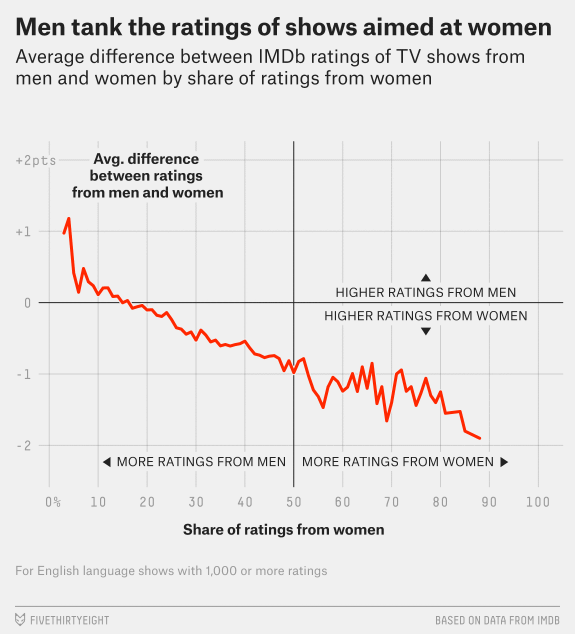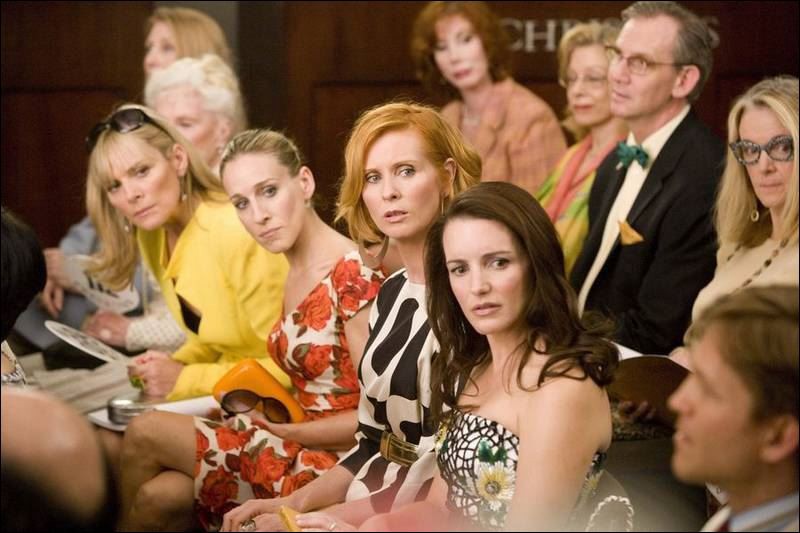It didn’t come as a surprise that a particular subset of men online set out to sabotage the upcoming all-female “Ghostbusters” remake. But surely that kind of intentional, misogynist scheme didn’t pertain to all entertainment that was either aimed at women, starring women, or had a large audience of women, right? Men don’t spend a significant amount of time online trolling through ratings sites like IMDb in order to trash women-centric entertainment, do they?
Well shit, actually there are men who do just that. According to a detailed investigation from website FiveThirtyEight, male users are sabotaging the online reviews of TV shows aimed at women.
The analysis began when the writer, Walt Hickey, noticed a discrepancy in the way HBO’s hit series “Sex and the City” had been rated on IMDb. “Any reasonable person should concede that ‘Sex and the City’ was an above-average television program (at minimum),” Hickey wrote. “You don’t need to think it was a perfect show, or even an outstanding one, but I think most people would agree it was better than average.”
Its IMDb ratings would argue otherwise. Hickey detailed, “‘Sex and the City’ has an overall rating of 7.0 on a scale from 1 to 10 — the average score of an English-language television series with 1,000 or more ratings is 7.3. So why did a show roundly considered seminal in the now ubiquitous genre of driven-New York-women-make-a-go-of-it programming score so low? Yeah, it’s men.”
Hickey pointed out that about 60 percent of the people who rated “Sex and the City” on IMDb are women. Accounting for those scores alone, the show has an above agerage rating of 8.1 rating. Male users made up just over 40 percent of “Sex and the City” raters and assigned it an average of 5.8, causing the overall score to lower.
For further examples, Hickey said, “all you have to do is look at how men rate TV shows aimed at women compared with how women rate shows aimed at men. When you rely on the wisdom of the crowd on the internet, you risk relying on the opinion of mostly men. Seventy percent of IMDb TV show raters are men, according to my analysis, and that results in shows with predominantly female audiences getting screwed.”

Hickey’s assertion is that “men feel compelled to crap on shows that plainly aren’t aimed at them.” And the numbers prove as much correct: “For a show with the IMDb average gender breakdown of 30 percent women and 70 percent men, men rated the show 0.5 points lower than women did, on average. When a show’s raters split evenly by gender, 50–50, men rated the program a full 1 point lower than women did.”
The piece goes into more detailed analysis, which you can read over at FiveThirtyEight, but his larger point is that the system of distilling anything into a singular numerical rating removes a significant amount of meaning, and will likely deter potential viewers from discovering something they’d probably enjoy. “And as long as [ratings] purport to underscore the true value of a work, they undermine people’s ability to find new and interesting material just because a subset of passionate and vociferous dudes on the internet somehow hold it in low regard,” concludes Hickey.
So next time you notice one of your favorite female-skewed shows or movies has a crappy rating on IMDb, it’s probably safe to agree with this report, and conclude, ‘Yeah, it’s men.”






